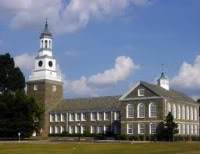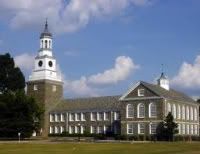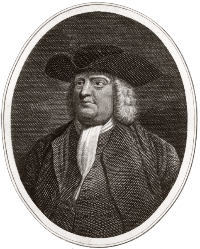William Penn's Legacy of Peace and Environmental Stewardship

I spent my K–12 years at a Quaker school in Philadelphia, William Penn Charter. And as one would imagine, an education based on Quaker values is rife with reminders of brotherly love and peaceful resolution to conflict. In fact, the Greek motto in the school’s seal translates into English as the command: “Love one another.”
I smiled as I read the school’s quarterly magazine this morning. My chest swelled with pride as I learned that the new Center for the Performing Arts was granted a coveted LEED certification (Leadership in Energy and Environmental Design) for its use of wind energy, recycled materials and natural insulation. How effortlessly Quaker philosophy and environmentalism go hand-in-hand; the imperative to make the world a better place lies at the very core of this warm and contemplative way of life.
William Penn and his values had a profound influence on his time (late 17th / early 18th Century — the school was chartered in 1689; Penn died in 1718) though, sadly, that influence has diminished greatly over the years. In particular, the Quaker belief that all people are equal under God served as a beacon of reason and civility in dealings with the native Americans in the entire Delaware region, until its flame was all but extinguished by the barbarism of the other settlers from England and Europe. Eventually, it became clear that Penn’s teachings and leadership by example were no match for the ceaseless violence and exploitation that have come to dominate the Western world since that time. To take an example of the day, when the English set fire to a Pequot village and massacred men, women and children, the Puritan theologian Cotton Mather (still extremely well regarded by history) said in celebration: “It was supposed that no less than 600 Pequot souls were brought down to hell that day.”
But Penn refused to succumb to the utter stupidity and brutality of the time. Undeterred by the constant stream of atrocities around him, he continued to dedicate himself and his brothers to kindness, decency, and the commonality of all humankind. In fact, he politely but firmly rejected any aspect of human relations that wasn’t based on this notion of equality and fraternity. When, late in life, he sailed back to England to meet King William III, he was urged to kneel and use supplicating language as he entered. Penn replied calmly, “I don’t think that will be necessary, since the king and I are both men.”
Members of the royal court held their collective breath as they looked on at this act of defiance, fearing a horrible outcome. Yet Penn walked in confidently with his chin up, smiled warmly, extended his hand to the king in friendship, and said in the purest of simplicity for which the Quakers would come to be known, “Hello, I’m William Penn. It’s a pleasure to meet you.”
I’m proud to be among three centuries of Penn Charter graduates who echo the same gratitude towards Penn, and share an abiding respect for his principles and legacy. It is indeed a pleasure – as well as a profound honor — to have met you, sir.



Thank you for the very uplifting post.
Gave me a clearer picture of your background. PA was a part of the country my mom grew up in; I would go up and see my grandparents in Wilkes Barre PA. You are a good writer.
America could use a great many more William Penn’s to displace some of the vast number of lesser men we have surrounding us every day.
In April of 2007, my wife and I ventured to Pennsylvania to see first hand some early American history, visiting Philadelphia (…and no, I didn’t feel the brotherly love) and a little town called Bird In Hand where we visited the Amish community. The trip was very much personally rewarding to us.
William Penn and the movement he foundered contain a great many noble values and and virtues. However it is also to be remembered that many of the indigeous people of the Americas did not share his beliefs and long before the coming of the European indulged in violent conflicts.
Another misunderstanding by writer is the custom of bowing to royalty. The person introduced to a royal personage bows not out of deferrence to the person, but to the position held. This is exactly the same priciple as saluting a superior in the military/flag/anthem. The rank is saluted, not the person. In the same way, the person of a sovereign represent all the citizens of the nation. The respect is accorded to the people of that nation.
William Penn may have felt that since his visit was unofficial, he was entitled to adress the man, not the “king’.
Thanks for a very uplifting post. It’s a much-appreciated reminder that, in every period in history, there are people who are out front, showing us the way. They may not get the full recognition they deserve, but they don’t need it! They know from within that they are doing the right thing.
Thanks for the complimentary comments. I’ve been trying to find stories that provide reason for hope in a troubled world.
Craig, Sorry to be the lone voice of dissention, but the tranquility of the Amish and other communities is paid for and protected by a vast and complex western society. you can’t have it both ways. It’s nice to contemplate the simple life of yesteryear, but the truth is that we all veiw the past through rose tinted glasses.
Would you really like to visit a 19th century dentist? Life was not so great for the contempories of William Penn. Plagued by diseases long since rendered extinct by modern science, grinding hardwork, great insecurity and at the mercy of the elements. Not so great either for those victims of the institution of slavery. (William Penn was a slave master, albiet a kindly one) .Those folk of yesteryear made the best of what they had, not from desire, but rather there was simply no choice!
It’s a popular belief that the investion of the motor car has has been an unheathy addition to the planet, yet as a result of the abolition of horse drawn traffic, hundreds of thousands lives (mostly infants and children) are saved every year, as a result of the disappearance of Horse Encephalitis.
I have an optimistic veiw of the future of our species. Manknind is on the verge of the exploration of space and the colonisation of the universe.
Of course, there ‘s always a price to pay for progress, but progress is inevitable, utopian dreaming of an idealistic world is not only impractical but irresponsible .
When I was a Penn Charter student I thought that my Biblical faith and that of my mother was impugned by at least the modern stripe of Quakers and Unitarians who taught at PC; indeed out of reaction to such rejection I sought out and read Puritans like Cotton Mather on my own. For me John Calvin is the most outstanding thinker of the last millenium. William Penn was a by-product of the Protestant Reformation.
All humans are sinners and need to be saved from their sins. Only Jesus Christ can bring us back in fellowship with God the Father, God the Son, and God the Holy Spirit. The Bible is uniquely God’s Word. The Puritans got all that right!
Craig,
I enjoy reading your postings on Renewable Energy World.
I believe that global warming is mankind’s opportunity to evolve and become civilized.
In educating about green building and renewable energy I have found that there are so many business opportunities available it is hard to choose which opportunity to take.
The green jobs future is a reality backed up by experience, something our administration has failed to fully get across to the public.
Improving the performance of our buildings is an area where we can quickly reduce our carbon footprint as we work to develop the technologies of renewable energy.
I believe that small scale local energy production is one untapped wave of the future that the big boys have left out of their calculations. Energy independence begins locally, it does not need to be a centralized big business enterprise.
We should all take a look at how we can make a difference in our daily lives at home and at work. We should also pressure our elected representatives to improve and extend residential energy incentives and make permanent the renewable energy tax investment incentives so businesses can make long range plans.
Oil company tax incentives do not run out every few years, energy conservation and renewable energy tax incentives should be improved and made permanent.
Wonderful to hear from you, and thanks for this terrific comment, Bruce. I agree with you 100%. You have most certainly identified the easiest, cheapest and best ways to make a short-term difference: a) retrofitting building using extremely standard and proven efficiency technologies and b) encouraging private citizens to get into renewable on a small scale.
Please see the email I just sent encouraging further dialog. Thanks again for getting in touch.
Craig, you have described precisely the spirit and Quaker ethic of William Penn. Although not everyone could describe themselves as “environmentalists,” the common sense approach to conserving energy, which is clearly your personal quest, is something in which we can all believe. I remain proud to be an OPC, and proud to be your classmate and your friend. Our beloved Old School has again shown that its Quaker ideals have remained stable but have not stood still. May Penn Charter remain the institution we all love, and may it continue to show leadership in its fourth century.
The late Mr. McGowan would be very, very proud of you and of Old Penn Charter.
Thanks very much, Duke.